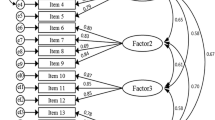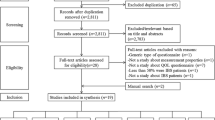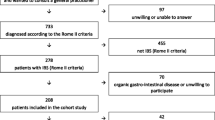Abstract
The Irritable Bowel Syndrome (IBS)-Quality of Life (QOL) is the most extensively validated health-related quality of life (HRQOL)-specific instrument for IBS with appropriate evidence for psychometric validity. Our aim was to linguistically validate the IBS-QOL for Mexico according to standard guidelines, to conduct further psychometric validation, and to compare the HRQOL between IBS patients from Mexico and North Carolina (University of North Carolina). Construct validity was tested by correlating scores from the Mexican Spanish IBS-QOL with those for anxiety and depression obtained by the Hospital Anxiety and Depression scale. Also, HRQOL from Rome I female IBS patients who consulted a tertiary referral center in Mexico was compared with that of female patients from UNC matched by age and bowel habit. A general univariate linear model was done to determine the most important variable over HRQOL, place of origin, or bowel habit. The majority of the IBS-QOL items had a negative correlation with depression as well as with anxiety. Compared to patients from UNC, the Mexican ones reported significant lower scores on Body Image and Health Worry and a trend in Interference with activities and in the Overall score. There were some differences in Dysphoria and Interference that were related to bowel habit, independently of the place of origin. In conclusion, the IBS-QOL validated in Mexican Spanish has shown construct validity. Using this instrument we found that female IBS patients who consulted a tertiary referral center in Mexico have lower HRQOL than those in North Carolina at least in factors such as Body Image and Health Worry.

Similar content being viewed by others
References
Testa MA, Simonson DC (1996) Assessment of quality of life outcomes. N Engl J Med 334:835–840
Eisen GM, Locke GR III, Provenzale D (1999) Health-related quality of life: a primer for the gastroenterologists. Am J Gastroenterol 94:2017–2021
Gralnek IM, Hays RD, Kilbourne A, Naliboff B, Mayer EA (2000) The impact of irritable bowel syndrome on health-related quality of life. Gastroenterology 119:654–660
Schmulson M, Robles G, Kershenobich D, López RR, Hinojosa CA, Duarte CA, Bandera J (2000) Los pacientes con trastornos funcionales digestivos (TFD) tienen mayor compromiso de la calidad de vida (CV) evaluada por el SF-36 comparados con pacientes con hepatitis C y pancreatitis crónica. Rev Gastroenterol Méx 65 (Suppl 1):50
Chang L (2004) Review article: Epidemiology and quality of life in functional gastrointestinal disorders. Aliment Pharmacol Ther 20 (Suppl 7):31–39
Patrick DL, Drossman D, Frederick IO, Dicesare J, Puder KL (1998) Quality of life in persons with irritable bowel syndrome. Development and validation of a new measure. Dig Dis Sci 43:400–411
Drossman DA, Patrick DL, Whitehead WE, Toner BD, Diamant NE, Hu Y, Jia H, Bangdiwala SI (2000) Am J Gastroenterol 95:999–1007
Acquadro C, Conway K, Giroudet C, Mear I (2004) Linguistic validation manual for patient-reported outcomes (PRO) instruments. MAPI Research Institute, Lyons, France
Bijkerk CJ, de Wit NJ, Muris JWM, Jones RH, Knottnerus JA, Hoes AW (2003) Outcome measures in irritable bowel syndrome: Comparison of psychometric and methodological characteristics. Am J Gastroenterol 98:122–127
Zigmond AS, Snaith RP (1983) The hospital anxiety and depression scale. Acta Psychiatr Scand 67:361–370
López-Alvarenga JC, Vzquez-Velzquez V, Arcila-Martínez D, Sierra-Ovando AE, Gonzles-Barranco J, Salín-Pascual RJ (2002) Exactitud y utilidad diagnóstica del Hospital Anxiety and Depresión Scale (HAD) en una muestra de sujetos obesos mexicanos. Rev Invest Clin 54:403–409
Thompson WG, Working Team for Functional Bowel Disorders (1994) Functional bowel disorders and functional abdominal pain. In: The functional gastrointestinal disorders. Drossman DA, Richter JE, Talley NJ, Thompson WG, Corazziari E, Whitehead WE (eds). Little, Brown, Boston, pp 115–173
Drossman DA, Morris CB, Hu Y, Toner BB, Diamant N, Leserman J, Shetzline M, Dalton C, Bangdiwala SI (2005) A prospective assessment of bowel habit in irritable bowel syndrome in women: defining an alternative. Gastroenterology 128:580–589
American College of Gastroenterology Functional Gastrointestinal Disorders Task Force (2002) Evidence-based position statement on the management of irritable bowel syndrome in North America. Am J Gastroenterol 97(Suppl):S1–S5
Bergman JF, Chassany O (1998) The role of quality of life in functional gastrointestinal disorders: regulatory issues. Eur J Surg 83(Suppl 5):87–91
Zuniga MA, Carrillo-Jimenez GT, Fos PJ, Gandek B, Medina-Moreno MR (1999) Evaluación del estado de salud con la encuesta SF-36: resultados preliminares en México. Salud Publica Mex 41:110–118
Schmulson M, Ortiz O, Hinojosa C, Arcila D (2006) A single session of reassurance can acutely improve the self-perception of impairment in patients with IBS. J Psychosom Res (in press)
Koloski NA, Talley NJ, Boyce PM (2000) The impact of functional gastrointestinal disorders on quality of life. Am J Gastroenterol 95:67–71
Badia X, Mearin F, Balboa A (2002) Burden of illness in irritable bowel syndrome comparing Rome I and Rome II criteria. Pharmacoeconomics 20:749–758
Halder SL, Locke GR 3rd, Talley NJ, Fett SL, Zinsmeister AR, Melton LJ 3rd (2004) Impact of functional gastrointestinal disorders on health related quality of life: a population-based case-control study. Aliment Pharmacol Ther 19:233–242
Frank L., Kleinman L, Rentz A, Ciesla G, Kim JJ, Zacker C (2002) Health-related quality of life associated with irritable bowel syndrome: comparison with other chronic diseases. Clin Ther 24:675–689
Kellow J, Lee OY, Chang FY, Thongsawat S, Mazlam MZ, Yuen H, Gwee KA, Bak YT, Jones J, Wagner A (2003) An Asia-Pacific, double blind, placebo controlled, randomised study to evaluate the efficacy, safety, and tolerability of tegaserod in patients with irritable bowel syndrome. Gut 52:671–676
Schmulson M, Remes JM, Olivas T, Valdovinos MA, Hinojosa C, Chang L, Mayer E, Naliboff B (2003) Clinical characteristics and QOL in IBS patients from Mexico and the USA: Are they different? Gastroenterology 124 (Suppl 1):A-395
Carr AJ, Gibson B, Robinson PG (2001) Measuring quality of life. Is quality of life determined by expectations or experience? BMJ 322:1240–1243
Park MI, Camilleri M (2005) Genetics and genotypes in irritable bowel syndrome: implications for diagnosis and treatment. Gastroenterol Clin North Am 34:305–317
Hahn BA, Ya S, Strassels S (1999) Impact of irritable bowel syndrome in the United States and United Kingdom. Digestion 60:77–81
Acknowledgment
We thank MAPI Research Institute for all their support in the validation process of the IBS-QOL for Mexico.
Author information
Authors and Affiliations
Corresponding author
Rights and permissions
About this article
Cite this article
Schmulson, M., Ortiz, O., Mejia-Arangure, J.M. et al. Further Validation of the IBS-QOL: Female Mexican IBS Patients Have Poorer Quality of Life Than Females from North Carolina. Dig Dis Sci 52, 2950–2955 (2007). https://doi.org/10.1007/s10620-006-9689-9
Received:
Accepted:
Published:
Issue Date:
DOI: https://doi.org/10.1007/s10620-006-9689-9




